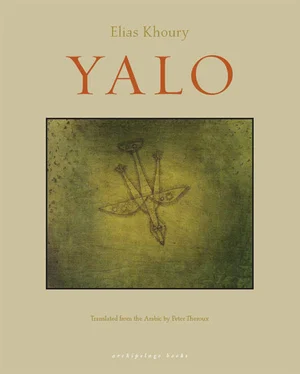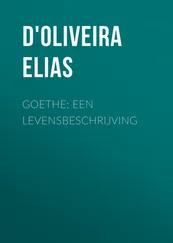Nor had Yalo seen the blood of her virginity.
“Where’s the blood?” he asked her.
She pointed to what resembled butterflies drawn in a floral color on the white sheet. He pulled her to him and told her she would remain a virgin forever.
Yalo must not refer to Mr. Salim and his son the engineer in the story of his life, so how could he explain his infatuation with wood inlay and Arabic calligraphy?
“I am an artist,” he told his grandfather when the cohno proposed that he join a religious seminary. “No. I don’t want to be a cohno . I am an artist, and someday when I’m older I want to be a calligrapher.”
But he did not become a calligrapher. His grandfather died a year after they left West Beirut during the war. Yalo joined the barracks and became a fighter, like thousands of young men who left their studies and met the fate that the war had fashioned for them.
How would he explain to the interrogator his beautiful script, his infatuation with wood, and its connection to Madame Randa?
It was true that the name Randa had not been spoken during the two months of questioning he had spent in torment. But who could guarantee for him that the fortyish woman would not appear at any moment and claim that he raped her? And how would he explain his knowledge of woodworking if she were to acknowledge her relationship with him?
Yalo lived alone in the Kesrouan village of Ballouna, which experienced a major revival during the Lebanese civil war, as was the case with many villages in Kesrouan, the heart of the Maronite area in Mount Lebanon, which was peripheral in the war. So it became a refuge for people fleeing other regions of Lebanon. There was a neighborhood of Greek Orthodox who had left Mseitbeh in West Beirut, which resembled their old quarter in Beirut. They built a church to which they gave the name St. Nicholas, which came to be called Mar Nicholas, in which served Father Seraphim Azar. There, Beirut accents, which overburdened the letters and were pronounced with both cheeks, mingled with the Kesrouan accent, which twisted Arabic and melded its letters together in a strange manner.
Yalo lived alone in his cottage and got acquainted with boredom. One day Madame summoned him — M. Michel had traveled to France to take care of some business of his there — to ask him to help her repair one of the valuable mother-of-pearl inlaid chairs; it had tipped over, breaking one of the legs. She asked him to carry the chair to the car so that she could take it to the carpenter.
“Why the carpenter?” asked Yalo. “I know how to fix it.”
Yalo sat on the floor and began mending the chair. When the Madame saw him at work, she asked him why he was not using nails, and he explained to her that this kind of wood did not need nails.
“How do you reattach it? With glue?”
Yalo told her about dovetailing and how wood could be made male or female, and how once the pieces were joined, they clove together permanently.
“Male and female, huh?” she said.
“Come, look, Madame,” Yalo said.
She leaned over the back of the slender young man who was bent over the wood, giving off the scent of jasmine.
“That’s what you call the joining of tenons and mortises?” she asked.
“Yes, it’s called ta’shiq , the coupling of wood,” he said.
“So wood is like people, it cleaves together?”
“Wood is better than people, Madame. Because it stays together.”
“Without getting bored?” she laughed, and left the living room. At that moment Yalo sensed the ghost of randification, and he would call that year the year of ta’shiq .
She told him that she fell in love with him as he was joining the wood, and that she wished he had taken her just as the wood took the wood and stayed that way permanently.
He would have to eliminate Mr. Salim, his son, and the ta’shiq from his story. It was true that he had spoken to Madame Randa about the old blind man and his infatuation with Arabic calligraphy, and how Wajih the engineer had made him memorize whole verses from the Koran so that he could engrave them on the wooden doors. But what should he do? If he wrote the story, he might lose his Lebanese citizenship, and if he didn’t write it, he might end up in an endless labyrinth. Yalo was aching for a second cigarette. He put the end of his pen between his lips, and began to suck at it and blow imaginary smoke in the cramped cell. He got up and paced, trying to organize his memory. “I have to tie the story together with a single thread,” thought Yalo, and before his eyes appeared a line of blood extending from Ain Ward to Beirut — “My line,” Yalo said to himself. “I began there with my grandfather the cohno , all of whose family members were killed in the massacre. Who could account for a massacre victim? I’ll write that I was slaughtered. I, Daniel, am the descendant of the victims of the massacre. My grandfather was born in blood, and began to drink blood Sundays with every mass he celebrated. And I’ve gotten drunk on blood. What does it have to do with me? Did I start the war myself? Everything you say is true, but me too, I am true. Anyway, there were no explosives. I swear to God this business of explosives, of Haykal or Abu Ahmad al-Naddaf, is a frame-up. They made me confess so that the sack torture would stop. It was either I confess to being in with the explosives gang, or I get more of that wild animal in the sack that attacked me from below. I either agree, or eat shit. And the way it turned out, I agreed and ate shit anyway.”
Yalo sat down behind the green table, took the pen posed between his lips like a cigarette, looked at the blank sheets of paper, and wrote his story again.
My name is Daniel, but everyone calls me Yalo, I’m from the Syriac Quarter in Beirut. I was born in 1961, I’m an only child, I have no brothers or sisters. We left the Syriac Quarter in Mseitbeh in 1976 because the war had intensified and we were afraid of the religious feelings that were mounting. We had a big house surrounded by a garden with every kind of tree — loquat trees, almond trees, acacias, China trees, and date palms. We left our house without taking any of our belongings and went to the neighborhood of al-Mrayyeh in Ain Rummaneh. There my mother rented a furnished apartment from one of her clients. My mother is a seamstress, and her customer arranged the place for us at two hundred fifty lira per month and said it was temporary. I moved from the St. Severus School to the Taqaddum School. My grandfather the cohno was unemployed because in our new neighborhood there were no other Syriac families. My grandfather died of grief. My mother was without work in Ain Rummaneh, so she started to go from house to house to do day work. That is, she would go to a house and spend the whole day there, sewing whatever they needed, lengthening or letting out their clothes, raising hems or cutting cloth. She was paid by the day, not by the kind of work. Our situation became very difficult. I did not fit in well at my new school. The grades were all mixed together, and most of the students were from families that had fled from Damour. I left the school and joined the war. Tony took me to Achrafieh and there I got to know a guy named Alexei, who was a White Russian, and one of the leaders of the Billy Goats Battalion. Alexei asked me if I wanted to become a goat and I told him no. I told him I wanted to fight to defend my country. Tony laughed at me and said that I did not understand the language of war. He told me, say that you want to be a Goat. I said I was willing to be a goat, and I became a fighter, and I fought.
I fought because my grandfather urged me not to emigrate. He told me that emigration kills a man’s soul and makes him a wanderer. He told me about his emigration from Ain Ward to Al-Qamishli when he was fifteen years old.
Читать дальше












